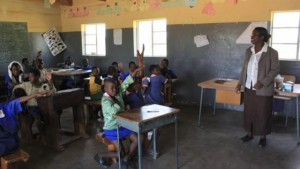Education is the most important empowerment tool – any country in Africa that fails to educate their girls, condemns them to a life where they are treated as second-class citizens.
It is in fact very difficult to overstate the case for education – but the issue is mainly about how to pay for it. In Zimbabwe when the MDC controlled the Ministry of Finance and the budget, we fixed the basic budget base for education at about 23 per cent of the national budget.
This is well above what other countries provide for education, but it was and is still totally inadequate. We have 3,5 million young people of school going age and if you divide that number into the national budget you come up with a per capita budget of $20 per month.
With Independence came a desire to extend education to all and the result was a rush to expand the state system – formerly largely restricted to the minority white community - by thousands of new schools. Enrolment expanded exponentially and a crash programme of teacher training poured tens of thousands of new teachers into the system. Funding could not keep up and standards began to slide as experienced and qualified teachers left the service for greener pastures.
Very exciting
The early results of the expanded system were very exciting – literacy rose to over 95 per cent of the population – the highest in Africa.
The schools heroically tried to maintain standards and at first they were successful but inadequate funding started to take its toll by 1990. Since then the process has accelerated and today many students emerge from our system neither functionally, literate or numerate.
Our College and University system was also expanded massively and this process continues today – right now we have plans to establish another four universities even though we cannot afford to run what we already have. The result is that standards have declined and the decision last year to award a PhD to the wife of the President after three months of work, marked a new low point in the domestic system of higher and tertiary education.
Almost unobserved, the international community has established a system of polytechnics that has seen one in every large town and city. These have fared no better as funding has declined on a per capita basis.The problem is quite simple really – we have to pay our teachers on the basis that they are an elite force and are the principle change agents in our society.
I have done a simple calculation of what would be required to do that and I cannot see us doing it for less than $60 a month for every primary school student, $100 a month for ever secondary school student and $200 per month for College and University students.
This would mean we would have to spend our entire budget of $4 billion a year on education with nothing left for anything else. Clearly that is not possible – so what is the solution?
Our private school system shows the way in a partial sense – this system comprising perhaps 5 per cent of the schools provides a high standard of education at a cost of between $200 and $500 a month.
Exceptional standard
These schools turn out graduates of an exceptional standard and unfortunately the great majority go on to study outside Zimbabwe where the Universities consistently report that they are the best students and that their fees are critical to the maintenance of a high standard of university education.
In our primary and secondary system the problem remains – inadequate funding and the problem of ensuring that all girls are brought into the system and given a real start in life persists. In my view these problems can only be overcome by handing all schools over to the communities they serve and allowing Parents to support the schools from their own resources.
That would mean that about a third of all students and perhaps as many as three quarters of all girls would require a subsidy on top of whatever grants the State could afford.
Only the international community could pick up that task and in terms of the MDG Goals, it is perhaps time that this challenge was met by international organisations on a more systematic and long term basis until our own economy grows to the point where it can fund the system on its own.
Post published in: Featured


